 Petzlover
Petzlover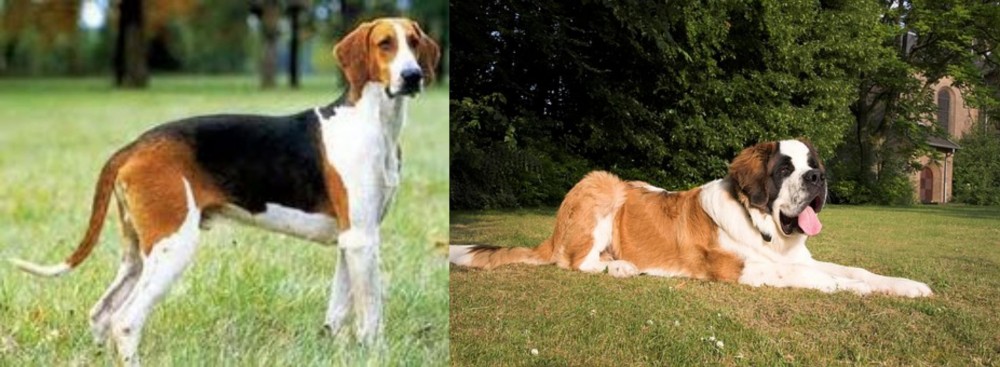 Grand Anglo-Francais Tricolore is originated from France but St. Bernard is originated from Switzerland. Both Grand Anglo-Francais Tricolore and St. Bernard are having almost same height. Grand Anglo-Francais Tricolore may weigh 55 kg / 121 pounds lesser than St. Bernard. Grand Anglo-Francais Tricolore may live 3 years more than St. Bernard. Both Grand Anglo-Francais Tricolore and St. Bernard has almost same litter size. Grand Anglo-Francais Tricolore requires Low Maintenance. But St. Bernard requires High Maintenance
Grand Anglo-Francais Tricolore is originated from France but St. Bernard is originated from Switzerland. Both Grand Anglo-Francais Tricolore and St. Bernard are having almost same height. Grand Anglo-Francais Tricolore may weigh 55 kg / 121 pounds lesser than St. Bernard. Grand Anglo-Francais Tricolore may live 3 years more than St. Bernard. Both Grand Anglo-Francais Tricolore and St. Bernard has almost same litter size. Grand Anglo-Francais Tricolore requires Low Maintenance. But St. Bernard requires High Maintenance
 Originating in France, the Grand Anglo-Francais Tricolore has been recognized by the United Kennel Club in 2006. He was developed in France in the 1800s.
Originating in France, the Grand Anglo-Francais Tricolore has been recognized by the United Kennel Club in 2006. He was developed in France in the 1800s.
He is a rare breed, even in France. Today he is essentially a hunting- and scentdog and isn't really kept as a companion pet. The breed is recognized in France too by the French Kennel Club and also recognized internationally in 1983. In France today the dog is bred and kept primarily as a hunting dog and pet combined.
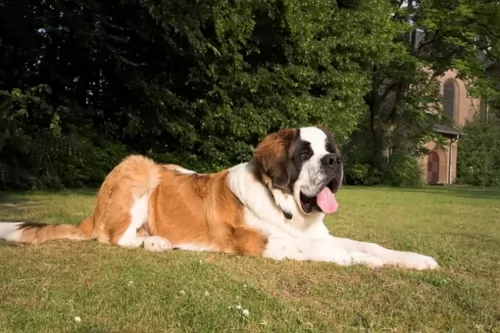 The St Bernard breed was once called the Alpine Cattle Dogs or the Alpine Mountain Dogs. They have always been farm dogs and mountain dogs in the French and Swiss Alps. They come from the border land of Switzerland and France. They were herding dogs, hunting, search and rescue, watchdogs and draft dogs.
The St Bernard breed was once called the Alpine Cattle Dogs or the Alpine Mountain Dogs. They have always been farm dogs and mountain dogs in the French and Swiss Alps. They come from the border land of Switzerland and France. They were herding dogs, hunting, search and rescue, watchdogs and draft dogs.
Their ancestors are considered to include the Sennenhunds and molosser breeds that came to the Alps with the ancient Romans. There are four Sennenhund breeds that are believed to have contributed to the original St. Bernard. These included the Greater Swiss Mountain Dog (Grosser Schweizer Sennenhund), the Appenzeller (Appenzeller Sennenhund), the Bernese Mountain Dog (Berner Sennenhund) and the Entlebucher Mountain Dog (Entlebucher Sennenhund) Today the St. Bernard is considered a Molossoid breed.
The first we know of the St. Bernard in any written records was in 1707 at the Great St. Bernard Pass and Great St. Bernard Hospice run by monks. There were found paintings of the dogs dating back into the late 1600’s. It is told that Barry saved upward of 100 people in the St. Bernard pass, and it is from these stories that the dogs gained their snow rescue reputation.
The St. Bernard of that time did not look like the St. Bernard does today as there was much crossbreeding. Many dogs dies during rescues in the avalanches of the mid 1800’s and so they Saint was crossed with the Newfoundland to preserve the breed. You can today see the resemblance in the build and looks of the two breeds. This cross brought about the long haired St. Bernard whose fur was too heavy for rescues.
The St. Bernards of mountain rescue fame were only about the size of a German Shepherd dog and were short haired. After crossing with the Newfoundland and moving into clubs and dogs shows, they have been bred to be much larger. Before the stud book was closed, it is thought that many larger breeds such as the Greater Swiss Mountain Dog, the English Mastiff, the Tibetan Mastiff, the Rottweiler, the Great Pyrenees, the English Bulldog, the Great Dane, the Bernese Mountain Dog, the Boxer and the Caucasian Oycharka all contributed to today’s St. Bernard.
In 1884 The Swiss St. Bernard Club was founded and the breed entered the Swiss Stud book as its first entry in 1884. It was 1888 when the standard was approved and the breed became the national dog of Switzerland. Before the name St. Bernard came to be common, these dogs might be called, Barry Dogs, Alepnmastiff, Noble Steeds or Saint Dogs.
The dogs came to England in the early 1800s and to the United States soon after. They were recognized by the European kennel clubs first and by the early 1900’s they were the most popular breed in the AKC.
 Looking quite a bit like its Foxhound ancestors,the muscular Grand Anglo-Francais Tricolore is a large dog standing at 60cm to 70cm tall at the withers and weighing in the region of 30kg and 35kg.
Looking quite a bit like its Foxhound ancestors,the muscular Grand Anglo-Francais Tricolore is a large dog standing at 60cm to 70cm tall at the withers and weighing in the region of 30kg and 35kg.
The Tricolore has a fairly broad, flat head, black nose and large brown eyes. His ears are set at eye level, they are medium length and floppy. The legs of the dog are straight and strong and the chest is deep and broad. The tail is long and slim. His double coat coat is short and smooth and he is tri-colored – tan, white and black.
Your Grand Anglo-Francais Tricolore has always been used as a hunting dog and scenthound and has been used in a hunting team. The dog has been created by crossing French scenthounds with English Foxhounds, with this particular dog being descended from crosses between the Foxhound and the tricoloured Poitevins.
There are actually 3 Grand Anglo-Français breeds, with this Grand Anglo-Français Tricolore being one. He is a docile dog and doesn't make a particularly good watchdog. The dog enjoys the company of other canines and while he can get on well with his human family, and is good and patient with children, he isn't the ideal pet with children, as his mind is on hunting and the chase and following exciting scents.
He is a dog totally dedicated to hunting and hunting in packs sees him getting on well in the presence of other dogs. His strong hunting instinct and his wish to roam on a scent makes it that he will require a very large garden.
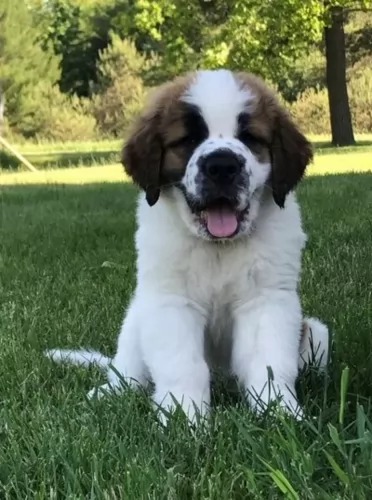 Today’s St. Bernard is not a large dog, he is a giant dog. Weighing in at 140-200 pounds and standing 28 to 35 inches tall, he is a lot of dog. Bred with mastiffs and large mountain dogs, they have proportional and powerful build. They are strong, sturdy and well muscled. They have either a smooth or rough (short or long) coat. Their eyes are brown or occasionally blue. They have tight lids, and square heads and muzzles.
Today’s St. Bernard is not a large dog, he is a giant dog. Weighing in at 140-200 pounds and standing 28 to 35 inches tall, he is a lot of dog. Bred with mastiffs and large mountain dogs, they have proportional and powerful build. They are strong, sturdy and well muscled. They have either a smooth or rough (short or long) coat. Their eyes are brown or occasionally blue. They have tight lids, and square heads and muzzles.
There are two coat types called smooth and rough, or short and long. The smooth shorter coat is tough, flat and close against the body and the long, rough coat is dense, wavy and heavy around the legs, neck and ruff. Both types have long tails that hang low and are heavy. Saints are known to slobber, drool and snore.
 The Tricolore is an excellent hunter but he also makes a good family pet. Because of the dog having ingrained hunting skills you won't find him being used essentially as a pet.
The Tricolore is an excellent hunter but he also makes a good family pet. Because of the dog having ingrained hunting skills you won't find him being used essentially as a pet.
He can be stubborn, but with training and socialization he can become obedient and amicable. He is a dog that will require a great deal of exercise as he is an exuberant dog and won't do well in an environment where there is scant regard to outdoor living and exercise.
While hunting is a great love of this tri-colored dog, he is also capable of being a loving and devoted pet.
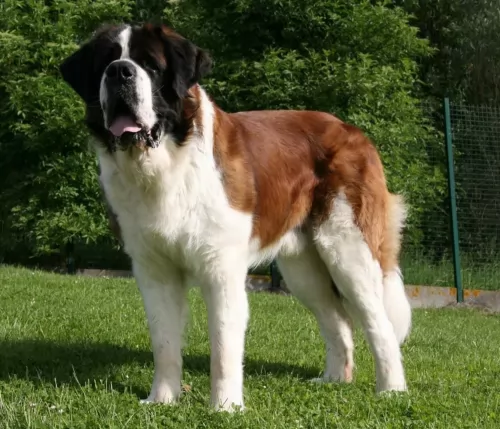 3.Adaptability no - these are giant dogs that need a lot of room. A large fenced yard or farm is best. They won’t do well in an apartment. They need exercise every day and loping around a yard is very good for them. They love to play in the snow, carry a backpack or pull a cart. They love to have a “job”
3.Adaptability no - these are giant dogs that need a lot of room. A large fenced yard or farm is best. They won’t do well in an apartment. They need exercise every day and loping around a yard is very good for them. They love to play in the snow, carry a backpack or pull a cart. They love to have a “job”
4.Learning ability – They are smart and highly trainable if motivated. They may appear lazy but they are just laid back and need a motivation.
 Living to be about 10-13 years of age, your Grand Anglo-Français Tricolore is fortunate to be a healthy dog, but just like many other dogs, he may well get sick and then, as a responsible dog owner, you need to get your 4-legged family member to the vet.
Living to be about 10-13 years of age, your Grand Anglo-Français Tricolore is fortunate to be a healthy dog, but just like many other dogs, he may well get sick and then, as a responsible dog owner, you need to get your 4-legged family member to the vet.
An abnormal hip joint can be hard for your dog as you notice him becoming less active and battling to get up after lying down. Hip dysplasia can lead to osteoarthritis, a limp and lameness. Get him to the vet so that you can at least help with making your pet's problem easier to bear.
Typically with deep chested dogs, the Grand Anglo-Français Tricolore can develop the life-threatening problem of bloat, when the stomach twists.
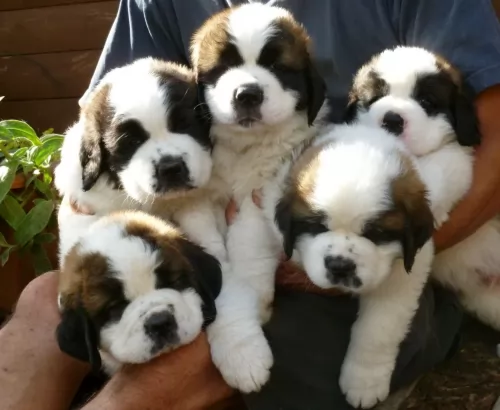 The first problem this breed faces is how fast they grow and gain weight. This can lead to serious health issues if not controlled. Their bones can be damaged by this excessively fast rate of growth. Other issues facing the breed include:
The first problem this breed faces is how fast they grow and gain weight. This can lead to serious health issues if not controlled. Their bones can be damaged by this excessively fast rate of growth. Other issues facing the breed include:
 The exercise requirements of this breed are high and he thrives on being busy and being involved in a hunt. If you do happen to keep him as a pet, he will require plenty of intense exercise from going on walks to joining in with your jogging and cycling activities. He just never seems to get enough exercise.
The exercise requirements of this breed are high and he thrives on being busy and being involved in a hunt. If you do happen to keep him as a pet, he will require plenty of intense exercise from going on walks to joining in with your jogging and cycling activities. He just never seems to get enough exercise.
The Grand Anglo-Français Tricolore requires little grooming and will do well with a good brushing twice a week to remove loose hairs.
For your Grand Anglo-Français Tricolore to be strong and healthy, he'll need protein for strong bones and muscles.Protein needs to be the primary ingredient in an active dog's diet. If you're not sure, ask your vet about the best kibble to feed him and add in some raw meat to this every now and then.
Where possible, cooked brown rice, vegetables and chicken can be added into the kibble too to make his diet more interesting and healthy. Fresh, cool water should be reachable for your dog 24/7.
 1.Feeding the puppy – You want to control their growth. Do not overfeed, and make sure they exercise but not too much. Feed a high quality large breed puppy food 3-4 X a day in small amounts.
1.Feeding the puppy – You want to control their growth. Do not overfeed, and make sure they exercise but not too much. Feed a high quality large breed puppy food 3-4 X a day in small amounts.
2.Feeding the adult – The problem you face with he adult St. Bernard is the potential for Bloat. Don’t over feed. Don’t feed before or after strenuous exercise. Feed 2-3 X a day in smaller amounts to prevent Bloat. Feed a high quality breed specific food if possible or an extra large breed formula.
4. Games and Exercises They need exercise but not as much as you might think. The St. Bernard is a laid back lumbering character so don’t over exercise her. They enjoy weight and cart pulling but they are not athletes who enjoy frisbee or agility. Search and rescue trials and tracking trials are perfect athletic endeavors for them.